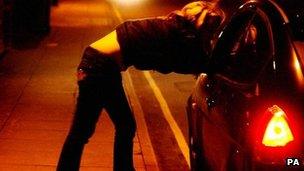Student prostitution prompts Swansea University study
- Published

The study aims to find out the motivations and needs of students who work as prostitutes
A study is to be carried out over concerns that students in Wales are turning to prostitution to pay for their education.
Swansea University has been given nearly £500,000 of lottery funding to find out how big the problem is and to help provide support.
The National Union of Students (NUS) said it was aware some students were sex workers and research was needed.
A scheme to stop racism in young people will also receive funding.
Swansea University's £489,143 grant will enable it to conduct a study into how many students are now working in the sex industry in Wales and to try to find out why.
Sexual health agencies, academics and the NUS are concerned that increasing numbers of students are becoming sex workers in Wales to pay for their education, and that these students may not be accessing appropriate sexual health services.
However, they only have anecdotal evidence in Wales and say an in-depth study into the issue is needed.
Dr Tracey Sagar, a lecturer at the university's Centre for Criminal Justice and Criminology who specialises in the regulation of sex work, said: "At the moment we know we have a student sex worker community in Wales but we do not really understand their motivations and needs.
"This project will address this knowledge gap and develop services which are fit for purpose."
Support needed
Stephanie Lloyd, NUS Wales' women's officer, said there was "anecdotal evidence" of students working as prostitutes but that research would help them to target support in the right places, such as providing sexual health advice online.
"It's certainly an issue that's on our radar and something people have spoken about for a while," she said.
"We don't have figures for exactly how many students are sex workers but the good thing is that we're finally going to get hard evidence of the scale of it.
"There's definitely a lot of anecdotal evidence about the issue saying it's a problem, so that's something we're concerned about.
"But unfortunately the support for these people currently isn't there. Part of the project will be research and part of it will be the development of that support.
"We have some rough ideas of what is needed, such as information around sexual health provision. And it may be that it takes a form of e-health like websites that give people the right support and help. As for these people to go to speak directly to someone is often difficult."
She said students' reasons for working in the sex industry were not fully known and should not be based on assumptions.
"The research is vitally important to the section of our membership who for years have been let down by a lack of evidence, advice and support on the sex industry," she added.
In December, the English Collective of Prostitutes, which runs a helpline from its base in London, said that the number of calls it receives from students had at least doubled in the past year and blamed increasing student fees.
'Racist rhetoric'
In total, five projects across Wales will share in the £1,376,049 awarded under the first round of the Big Lottery Fund's BIG Innovation programme, which aims to specifically support projects that test new ways of tackling social problems.
Among them, the Ethnic Youth Support Team (EYST) in Swansea has been given a grant of £169,616 to run the Think Project, which will develop new ways of working with the most disengaged young white people in Wales.
The project aims to respond to the challenges posed by the growing presence of far-right extremism in the UK and Europe, and the "growing normalisation of racist rhetoric, attitudes and behaviour at the local and national level".
Barnardo's has been given £265,572 to develop standardised assessment tools for use with teenage girls who have engaged in sexually harmful behaviour towards others.
Ash Wales has received £197,272 to create an interactive site on Facebook and establish a Twitter page to give young people information about the dangers of smoking.
And Sight Support has been given funding of £254,446 to create a referral contact centre for people with a visual impairment in Wales.
- Published14 December 2011
- Published14 December 2011